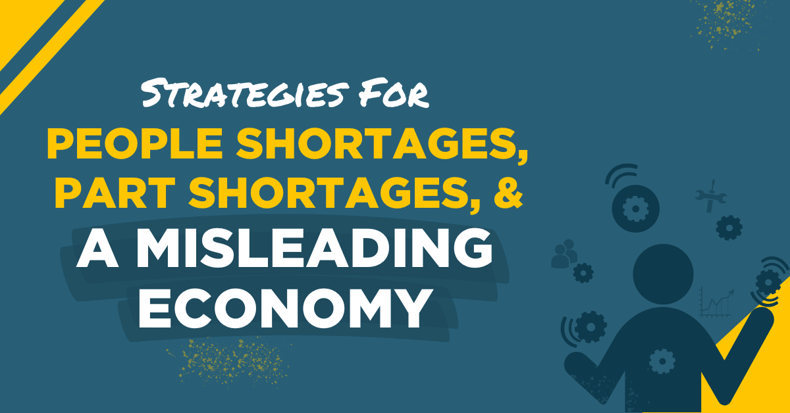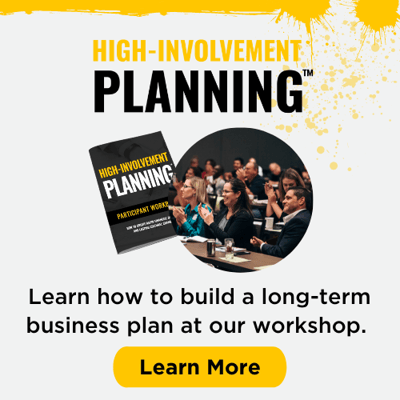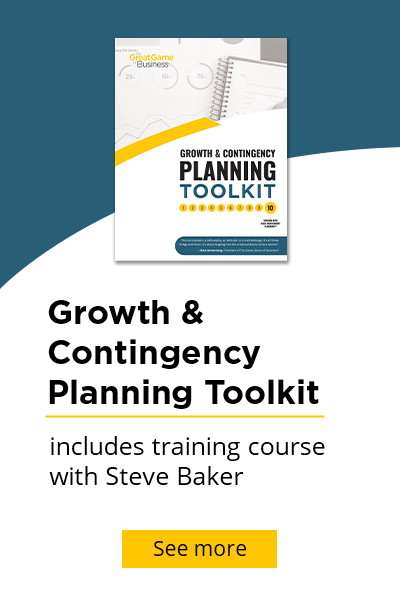
Every Friday, a think tank of Great Game™ coaches comes together to discuss pressing issues today's companies are navigating. They share out-of-the-box ways of thinking, how leaders can control different areas of the business, and how to mitigate the issues organizations have no sway over. We've listed some takeaways for leaders to consider when handling part shortages, people shortages, and preparing for an uncertain economy.
<< Learn more about our workshops focusing on implementation and strategic business planning. >>
 Solutions For A People Shortage
Solutions For A People Shortage
Ways Companies Are Handling Not Having Enough People, How To Attract People, and How To Retain The Ones You've Got
Alter Your Business To Serve At A Capacity Your Staff Can Handle
One way a restaurant in the Salt Lake area handles being understaffed is to reduce the number of people the restaurant serves at once. The company only lets in the number of customers their staff can match. In doing so, the restaurant can still offer quality service without overworking its people. Customers aren't being forgotten because the restaurant has found a way to make sure there are never too many customers for the staff to handle. Since the restaurant lets in fewer people, there ends up being a waiting line outside the door which offers good publicity. It shows people, "Oh, wow, that place must be really busy," and shows that people are willing to wait to dine there.
Out-of-the-Box Thinking
One coach shared how nationally, Domino's has sort of employed their customers. If a Domino's customer picks up their own pizza, they get three bucks off their order. They're giving customer's an incentive to pick up their own food as a way to reduce stress on their understaffed delivery team. Which is a huge win at a time when finding new hires is so difficult. So, consider thinking of clever ways you can employ your customers. Are there incentives you can give to customers when they help eliminate work for your staff?
Recruiting Retirees As Part of Your People Strategy
One solution to attracting and recruiting talent is to take advantage of those who are officially retired, but still want to do some part-time work. Reaching back out into the retiree talent pool and allowing those people to do exactly what they love to do, while still offering them that part-time flexibility, can be a great way to fill in those talent gaps. There are quite a few people that fall into that category where they want to have Fridays, or Mondays off to go fishing, but want to work a couple of hours during the week. Retirees have an enormous amount of really, really deep skills to share, making them the perfect candidates for an apprenticeship model. So when you bring in a retiree, you're given the opportunity to also bring in a younger or less experienced person that can buddy up with and learn from that individual. By building that apprenticeship program, your organization can start to retain those deep skills over time. For not-for-profits, there's actually a program here in Springfield called Give 5 that takes people leaving the workforce and helps get them engaged and connected with organizations that can provide meaningful and purposeful volunteer opportunities. That's a great way for those not-for-profit organizations to get the help they need without taking on more costs.
.png?width=80&name=Chat%20Bubble%202%20(1).png) Learn More Strategies For Recruiting Highly-Skilled Volunteers In The
Learn More Strategies For Recruiting Highly-Skilled Volunteers In The
Social Sector
Becoming the Employer of Choice
Several Great Game™ companies have done a lot of work to try and separate themselves from the competition by making themselves known as a "best place to work." These companies have gone out of their way to accommodate employees and they're seeing results. One coach added in, "you know, what drives me crazy is the number of teams of leadership that sit around and try to figure out what the employees want." Instead of leadership deciding what employees want, "go ask 'em," he said. It's important to know what employees are looking for because it's something that is always changing in every market. If you're trying to become the employer of choice, ask your employees what it will take.
Incorporate Stay Interviews Instead of Exit Interviews
Instead of exit interviews, try out "stay interviews." Many Great Game™ companies are starting to adopt this practice. So how it works is when a client begins coaching, the company completes a survey. Once the surveys are completed, the company's leadership team does an additional 15-minute interview with their employees to be able to draw more feedback and information from the surveys. Then, based on the themes identified throughout the surveys and interviews, the company can decide what's most important to work on based upon what employees want to improve. It is recommended that leadership not talk to their direct reports. By completing this process, organizations can identify, "Why work here at this company." Whether that's associated with the company mission, compensation package, or both.
Take The Time To Help Employees Fully Understand Their Compensation Package
Really helping people understand what their total compensation package includes and consists of, can be a great way to help retain talent. If you have some employees that are getting some really nice offers out there, and they don't fully understand their compensation package and everything your company has to offer, that's not going to do the company any favors. Once an employee comes back and says I've gotten an offer, and you're left trying to counter, you're already put in a bad position. But if organizations can get ahead of that and start reinforcing the value of working at their companies, they might be able to prevent an employee from entertaining a recruiter and seeing what another company may offer.
Create A Career Path Document
Create a "career path document." Something to give new employees that shows them their opportunities for advancement and how they can move up in the organization. Make it a priority for the company and leadership to help people get where they want to go. That physical piece of paper that people can visualize makes a big difference. People want to know they have opportunities for growth. They don't want to be stuck at a dead end. Establish career paths.
Create A Mutually Beneficial Program That Creates Opportunities For The Mentally Or Physically Disabled
Ask yourself "What are the tasks that a person could perform two days a week on the top of their dining room table from 2-4 in the afternoon?" There are all kinds of opportunities to partner with local mentally or physically disabled organizations. Companies can outsource or offload certain areas of work to a pool of individuals who are grateful to have work. It's meaningful work, it's important to your business, and it provides someone with a role they are deeply appreciative of. There are people in those sorts of situations, who will outwork and outperform critical components of your business. Don't overlook a talent pool. Often overlooked paths make for the best opportunities. When someone says, "Oh, we've looked everywhere. I challenge people to push harder," said one coach.
Engaging Private And Public Partnerships in The Social Sector
In the service industry portion of the not-for-profit sector, finding help is becoming a real issue. Demand has continued to increase over the past several years, leading to a lot of pressure and constraint on the social sector community, which in turn has led to a leadership exiting that sector. A lot of organizations in the social sector are looking at new ways of engaging private, and public partnerships to share talent through project and skills-based volunteering.
Increasing Efficiency By Cutting The Fluff
"Set up a game around what you are doing that a customer wouldn't pay for. Take a critical look at everything, from a personal vantage point that you're doing." By doing so you can identify the "waste" in the company or time and effort that's being spent that's not contributing to the company's mission or financial success. You want to bring that thinking about and take a good hard look at how you can be more productive at your job. Sometimes that means cutting some things that really don't matter. Like she said, "certainly, I understand. There's the health and hygiene component of every person's job — filling out expense reports and that sort of thing. But I would venture to guess, there are probably three things every person in every organization is doing that, if they really thought about it, maybe one isn't advancing the mission of the organization, and is something that a customer wouldn't pay for." You have to be able to find ways to be more productive with the people you already have.
 Solutions For Part Shortages
Solutions For Part Shortages
Ways Companies Are Handling Not Having The Right Parts, How To Work With Suppliers, and Rally Your Team Around Finding Solutions
Sharing Forecasts With Suppliers
Sharing forecasts with your suppliers and giving them a heads up on what parts you'll be needing 18 months out can benefit both parties. It's taking much more effort to track down parts and make sure companies have what they need to get the job done. Working together, maintaining strong communication, and healthy relationships allow for more opportunities for success. As one coach said, while his manufacturing company was working with a supplier, strong communication allowed the supplier to be able to say, "I can't get you that, but I can get you this other one, will that work?" Turns out, the alternative part worked just fine, so they were able to clear a backlog on that one part. Get your suppliers to help you solve problems.
Build A MiniGame™ To Rally Employees Around
The supply chain has absolutely been off-kilter, but there's also been a lot of finger-pointing at the supply chain. Why not assume some of the responsibility and think of ways to get progress back on track? One company put together a MiniGame™ (a short-term challenge to correct a weakness) that was built around a circus carnival theme – because it was like a three-ring circus out in the plant, just trying to get things out the door. So they created this game around filling schedules. It was all about focusing on what they could get out the door. Whoever the winners were from each department got to partake in a carnival game celebration. But the game forced employees to think of solutions rather than just pointing fingers and saying "the parts aren't here." So the team started looking at what they could do with salvage and how they could improvise by getting engineering changes approved to be able to provide other options. They started doing a lot of cross-training that they hadn't done before. Say maybe upstream production areas like disassembly were finished with what they needed to do, but the assembly side needed more people. They started cross-training to position people where they were needed up and down the production stream. But all of this was created because they put that focus around, "hey, we're all in this as a team. We know we have some parts shortages, we know we have people shortages, but let's find all those unique ideas and changes in processes so that we can still get products out the door to our customers."
.png?width=80&name=Coachs%20Tip%20Chat%20Bubble%20(1).png) Coach's Tip:
Coach's Tip:
Don't Let material shortages be An Excuse For Poor Performance
Material shortages are becoming the catch-all excuse for poor performance in many areas. Shareholders need to dig a little deeper for information to make sure the issue isn't something else, like poor decision-making or poor leadership. Of course, the supply chain is hindering many businesses, but there are several actions companies can be taking to mitigate the issue.
.png?width=60&name=Copy%20of%20Trend%20Icon%20(1).png) Beware Of A Misleading Economy
Beware Of A Misleading Economy
Companies Are Being Cautious of False Backlogs, Preparing Smart Contingency Plans, and Finding Reputable Data To Help Navigate the Economy
False Backlogs
Another issue is false backlogs. Companies are experiencing HUGE backlogs. So they think they've got all this future demand, but how much of it is real and how much of it is the result of panic buying and the whiplash effect? If you were to ship everything in your backlog, how much would you be overstocking your customers? That can come to an awful ending for a lot of people.
 Panic Buying And The Importance of Forecasting Cash
Panic Buying And The Importance of Forecasting Cash
As business leaders are struggling to make their way through parts and people shortages, one thing many are forgetting about is cash. Nobody's forecasting cash six months out. People are trying to figure out the supply chain and they're panic buying. Companies are tying up all their cash in inventory without being able to get any revenue because they don't have the parts to get their products out the door. Companies need to start thinking about what they need to do to make sure they have cash. If you run out of cash it's game over. People are changing how they're billing their customers. For example, say a manufacturer is going to build a customer something, it takes them three months to build it. They've started calling it a construction loan, and they're having their customers pre-pay us for the product. Business leaders need to understand the impact of cash when they pursue opportunities. If we are approaching the beginnings of a recession, one bad decision could be detrimental. As a coach said, "you could accept that $1 of opportunity that could take you out."
.png?width=80&name=Chat%20Bubble%202%20(1).png) Cash is King: A training bite to rally employees around improving company cash flow
Cash is King: A training bite to rally employees around improving company cash flow
Building Backup and Contingency Plans
There's been lots of talk about a recession and how close the next one will be. Of course those words are alarming to anyone. People are really starting to be aware of the importance of having backup plans. Leaders are starting to build some business plans around expectations of future losses of business. What happens if this supplier goes out of business, who's our backup? If our business goes from where our revenue is today to 75-50%, what happens? People are seeing some things on the horizon, so start thinking about what kind of contingency plans you need to have in place.
Using Reputable Data
Finding a reputable source of data that you can rely on for quality and accurate information is crucial. We encourage using ITR Economics. ITR Economics is an economic firm that SRC and The Great Game of Business® have been following for around 20 years. Their track record in terms of forecast accuracy has been incredible. They're plain-spoken, practical economic economists that can talk our language – business entrepreneur language. They have a good hold on what's really happening. There's a lot of talk in the media about where we're headed in terms of a recession and a lot of the information being distributed probably isn't the reality. The media can cause a lot of unnecessary panic that way, which can actually have a negative effect on the economy based upon the way that misinformation is making decison-makers react. It's nice to get a reality check from ITR to share with our clients. So we're making better decisions around what business cycle we're really in, where we are headed. We need to be doing more long-term planning and making sure we are preparing are companies for what lies ahead. It's important you have a reliable source of information to help build those long-term plans and contingencies.
.png?width=80&name=Coachs%20Tip%20Chat%20Bubble%20(1).png) Coach's Tip:
Coach's Tip:
Download ITR's app on your phone to keep up with the latest economic trends and forecasts.
Looking to stay ahead of your business, but don't have time to do all the planning? Let a business coach help you and your company get back on track.
Other articles you might like:
.png)


.png?width=790&name=See%20if%20a%20business%20coach%20is%20right%20for%20you%20(1).png)





.png)




-5.png)

